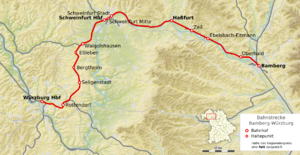Würzburg–Bamberg railway
| Bamberg–Rottendorf Railway | |
|---|---|
 |
|
| Overview | |
| Native name | Bahnstrecke Bamberg–Rottendorf |
| Type |
Heavy rail, Passenger/Freight rail Regional rail |
| Status | Operational |
| Locale | Bavaria |
| Termini |
Bamberg Rottendorf |
| Stations | 15 |
| Line number | 5102 |
| Operation | |
| Opened | Stages between 1852–1854 |
| Owner | Deutsche Bahn |
| Operator(s) |
DB Regio Erfurter Bahn |
| Rolling stock |
DBAG Class 612 DBAG Class 440 DBAG Class 146 Stadler Regio-Shuttle RS1 |
| Technical | |
| Line length | 92.2 km (57.3 mi) |
| Number of tracks | Double track |
| Track gauge | 1,435 mm (4 ft 8 1⁄2 in) standard gauge |
| Electrification | 15 kV/16.7 Hz AC Overhead line |
| Operating speed | 160 km/h (99 mph) |
| Route number | 810 |
The Bamberg-Würzburg railway is a two-track electrified main line railway in the German state of Bavaria. It is about 100 kilometres long and was built by the Royal Bavarian State Railways as part of the Ludwig's Western Railway (German: Ludwigs-West-Bahn) from Bamberg via Haßfurt and Schweinfurt to Würzburg. Between Bamberg and Schweinfurt, the line runs largely along the Main river. The line was opened in sections between 1852 and 1854 and is one of the oldest railways in Germany.
Before the completion of the modern direct route via Rottendorf, Kitzingen, Neustadt an der Aisch and Fürth, which could not initially be built because of the difficult terrain in the Steigerwald area, the eastern part of the Ludwig's Western Railway was of great importance for east-west long-distance traffic. As a result of the opening of the direct line in 1865, the Würzburg–Bamberg line is now mainly significant for regional and local transport. Until the division of Germany in 1945, more long-distance trains to Thuringia and Saxony used the Würzburg–Schweinfurt line than the line via Hof. In 1978, faster regional services were established, accompanied by the closure of several stations, as was the case on many lines in Germany during the 1970s and 1980s. InterRegio train services ran on the Stuttgart–Würzburg–Schweinfurt–Erfurt route from soon after German reunification until 2001.
...
Wikipedia
